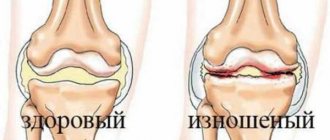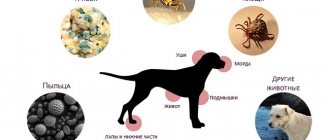Dogs are not just beloved pets, but full members of the family. When they get sick, it becomes a real tragedy for the owner. If suddenly, upon waking up in the morning, he discovered a swollen dog’s muzzle, then he needs to understand the reasons. Such a symptom cannot be left without attention. It is advisable to make an appointment with a veterinarian immediately. The fact is that it is not possible to independently discover what exactly was the provoking factor. So, let's look at the causes of the pathology and methods of treatment.
Main reasons
There are many reasons why a dog's face becomes swollen. What to do in such a situation will be discussed a little later. First let's look at all the factors. These include:
- Purulent inflammatory process.
- Allergy to external irritant or food.
- Consequences of injury, in particular hematoma.
- An inflammatory disease – myositis.
- Tumor formation.
- Reaction to drugs.
The main causes of edema in dogs
If your dog's paw or any other part of the body is swollen, you need to figure out what the reason is. If your dog is swollen, there are several types of this condition depending on what caused it.
- traumatic;
- inflammatory;
- collateral;
- stagnant;
- neuropathic.
What causes swelling of parts of a dog’s body:
- Parts of the body may swell due to frostbite or burns.
- In case of a blow or bruise, or any other traumatic damage to the capillaries, veins, nerve endings or lymph nodes.
- It can swell due to an insect bite (for example, a tick causes demodicosis, and the bite of the larvae of the Wohlfarth fly causes myiasis).
- As a reaction to fungi, viruses and bacteria.
- Allergic reaction (may also include vomiting).
- Due to the physiological characteristics of the body (for example, during estrus or pregnancy, in this case treatment is not required).
Important! The causes of swelling in a dog can vary, but most require veterinary intervention. Eliminating the cause on your own can be life-threatening for your pet.
Swelling on the paw due to injury
Allergy
The most common reason why a dog's face and eyes are swollen is allergies. There are a lot of irritants. A reaction in an animal can occur upon contact with chemicals, detergents (shampoos), and plants. Also a provoking factor are insect bites (bees, spiders, etc.). Less commonly, allergic reactions occur to medications, including vaccines. It is important to do a test before taking medications. This will help avoid serious consequences.
Food allergies are quite common in dogs. Some breeds, especially decorative ones, have a genetic predisposition to it. Food for such individuals must be selected carefully. Introduce new foods into the diet in small portions, checking the body’s reaction.
Regardless of what causes the allergic reaction, the consequences can be very serious. In severe cases, not only the dog's muzzle swells and throat swelling develops. And this can cause a rupture of the trachea. If heavy breathing and a change in the color of the mucous membrane (a characteristic blue color appears) are added to the main symptom, then you should immediately seek qualified help.
How to treat an animal if it has allergies? First of all, it is necessary to determine to what stimulus the reaction occurs. Contact with him should be completely excluded. After diagnosis, the veterinarian will prescribe a course of antihistamines and steroids. Treat the swollen area with antibiotic-based ointment. This will help reduce itching. Drug therapy must be supplemented with a special diet.
Treatment
Treatment of an existing tumor depends on the cause of its occurrence, as well as the complexity of its spread:
- An infectious tumor, most often, requires opening the edema in order to clean it and treat it. To help your dog recover faster, antibiotics may be prescribed.
- Allergic edema is relieved with diphenhydramine and various corticosteroids.
- Swelling caused by hematomas is treated in various ways, depending on its complexity, the absence or presence of bleeding, etc.
- Treatment of cancerous tumors is carried out depending on its location and the complexity of its condition.
- Swelling caused by muscle inflammation is treated with individually selected anti-inflammatory drugs.
Another common cause of swelling and swelling on a dog’s face can be dental problems. In dogs, just like in people, problems with teeth and gums can be painful and significantly complicate the dog’s life.
If your dog has swelling of the muzzle, a feverish state, lack of mood, depression, then this may be an obvious cause of tooth pain.
Dental treatment can only be prescribed by a veterinarian. A painful tooth may need to be removed, and to quickly restore the dog’s body, a course of antibiotics may be prescribed.
Swelling of a dog's muzzle can cause what is called urticaria.
Hives are not difficult to identify and distinguish from other reactions that cause swelling of the muzzle.
Hives manifest themselves as a type of allergic reaction in which visible blisters spread across the skin and the fur appears raised.
Hives itself is not dangerous for the animal, and soon this swelling goes away painlessly for the dog.
The most dangerous manifestation of urticaria can be when it is combined with Quincke's edema.
The causes of hives are as follows:
- - pollen of various plants;
- - dust;
- - new food products introduced into the diet;
- - medications currently being treated, etc.
One of the most dangerous and serious types of edema is angioedema, or as it is also called, Quincke's edema.
The cause of this type of edema can be any allergic component. A complicated type of edema has a predisposition to spread throughout the body and body. If the swelling reaches the respiratory tract, there is a high probability of death from suffocation.
The primary symptoms of Quincke's edema are:
- - observed redness or pallor of the oral mucosa;
- - gagging;
- - vomit;
- - rapid breathing and wheezing;
- - swelling of the muzzle.
Camel - description, habitats, diet, 130 photos and videos of the most popular camel species
At the first symptoms of angioedema, you must immediately take the animal to the nearest veterinary station and begin the treatment procedure.
Infections
If your dog's face is swollen, what should you do? The first step is to examine the scalp for damage. Often, after an insect or other animal bite, an infection develops at the site of the lesion. Pus accumulates in the wound. This leads to an increase in body temperature. Abscesses are most often localized on one side. May spread to the neck. Very painful.
If a dog's muzzle is swollen and he refuses food or water, then this is a sure sign of the development of an infectious process. Under no circumstances should you delay treatment. The fact is that pus can get into the blood, and this will lead to infection. Therapy includes taking antibiotics and anti-inflammatory drugs. Surgical drainage may also be needed.
Tumors on the pads
Dogs' paw pads are the most vulnerable spot. During a daily walk, the animal can get injured.
Insect and snake bites
The wound is treated with an antiseptic, the insect sting is removed, and covered with a bandage. To avoid complications, the animal is given any antihistamine.
Fractures, stab wounds
When the skin on the pads is damaged, the wounds bleed. The place of the cut or puncture is treated with an antiseptic, sealed with an adhesive plaster or a bandage is applied. The swelling goes away after complete tissue fusion.
The doctor determines the location of the injury, applies dressings, and fixes the limb with a plaster..
Bruises
The cause of injury is the animal falling from a great height or heavy objects on its limbs. The consequences are soft tissue swelling. They swell, bruise forms, and become painful.
If the injury is not serious (the skin is damaged), the animal is treated at home. They provide him with complete rest and apply cold to the sore spot.
For serious injuries, where muscles and subcutaneous tissues are involved, treatment is carried out by a veterinarian.
First aid: when to immediately contact a veterinarian
If, after an injury, damage to the skin, muscles, tendons, joints or bone tissue is observed, the animal is in a state of shock and does not self-medicate.
Linden tea: its properties, benefits and contraindications for the body
Tumors
A dog's swollen face may indicate tumor formation. They are localized in the mouth or throat. In addition to external changes, the animal’s appetite noticeably decreases. Bleeding may occur. Often, with neoplasms, a sharp, unpleasant odor emanates from the dog’s mouth. Swelling from the muzzle can spread to the eyes, which greatly increase in size. This happens due to uncontrolled cell proliferation.
Treatment should begin as quickly as possible. The fact is that malignant tumors lead to the death of a pet. However, if radiation therapy is started in time, it is quite possible to save the animal’s life. The doctor may also decide to remove the formation surgically.
Diagnostics
If your dog has a swollen face, the method of diagnosis will depend on the underlying cause. A medical examination is carried out only by a doctor.
- When infected, the damaged area becomes hot. You can determine it by touch. The dog has a fever. She reacts sharply to touch and may bite because she feels severe pain. Suppuration is visible in the wound. As a rule, examination is sufficient to make a diagnosis.
- If you have an allergy, you must undergo a general blood test. A skin scraping is also taken and a test is made to determine the type of irritant.
- If a dog's muzzle is swollen and the specialist suspects that it is caused by a tumor, then a comprehensive examination is prescribed. Biochemical analysis may be needed. The collection is carried out under anesthesia. The doctor punctures the formation with a special device and takes the material for examination.
Allergic reaction
It arises from a variety of phenomena and objects.
Just like people, their pets are prone to allergies. There are various factors that cause it:
- bitten by a wasp, spider, snake;
- reaction to medications or vitamin supplements;
- food products that are not suitable for your pet’s diet;
- flowering of plants or their juice;
- The dog's face is swollen after vaccination.
If the allergic reaction is serious and difficult for the dog to tolerate, then the swelling can change location from the muzzle to the throat. And this is already dangerous due to rupture of the trachea.
For example, a dog’s muzzle became swollen after a spider bite and acquired a bluish tint. At the same time, the pet’s breathing is difficult and has become hoarse, and the gums have turned purple or acquired any other color that is far from normal. This is a direct incentive to immediately contact a veterinarian.
Treatment
The specialist will definitely ask you about the cause of the allergy and adjust the treatment plan based on your answer. Therefore, it is very important to carefully monitor what caused the swelling and after what time the pet became ill.
It happens that the owner has no answer. Then they use a universal set of drugs - antiallergic drugs, steroids, antibiotics in the form of ointments.
Additionally, a gentle diet is prescribed. In addition, blood or part of the epidermis is taken for analysis. This is done to accurately determine the allergen to which the allergic reaction occurred.
Prevention measures
Many dog owners are interested in what preventive measures should be taken to avoid the formation of muzzle edema. It is worth noting that everything will depend on the reason. If we are talking about mechanical damage, then it is easy for the owner to prevent the development of pathology. Preventative measures are simple - closely monitor your pet. Do not allow him to come into contact with wild animals. You should also avoid fights with other dogs. Regularly inspect your pet's skin and mouth. Sniff the smell from the mouth. This will help to detect the inflammatory process in time and begin treatment.
It is important to exclude hard bones from your diet. When split, their edges become sharp, which can injure the gums. Accordingly, this leads to the development of an abscess. If the cause of swelling is an allergic reaction, then you can take tests to identify the irritant. The owner will have to limit the animal's contact with all substances that may cause a reaction.
Unfortunately, there are reasons why swelling appears regardless of the conditions of detention. These include tumors. In such a situation, the sooner therapy is carried out, the greater the chance of recovery for the pet.











